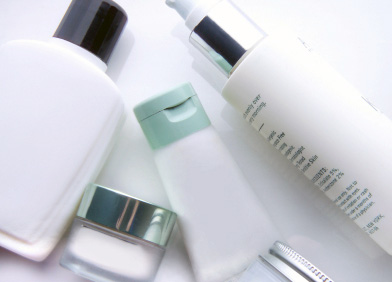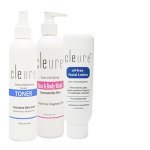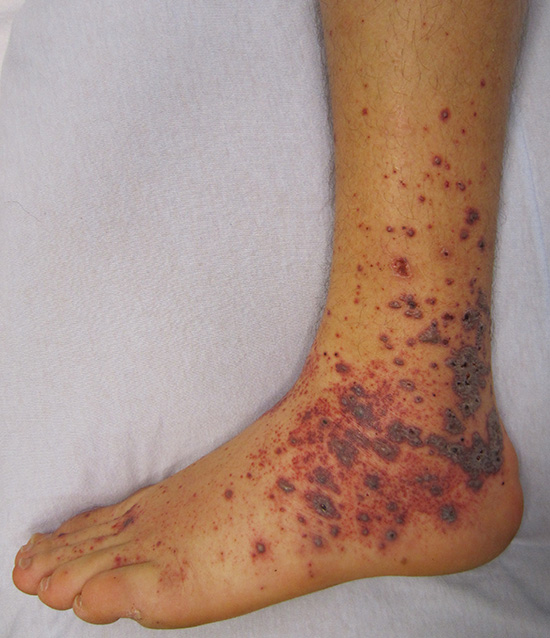Salicylate Free Products
How to Manage Salicylate Intolerance
Where do you find salicylate free products if you have salicylate allergy or salicylate intolerance? What are salicylates and how do they affect your sensitive skin? Can you prevent salicylate sensitivity?
These are some of the questions we will attempt to answer here, so that you can be educated about salicylates and how they may be affecting your sensitive skin. We are dedicated to helping you reduce skin inflammation and outbreaks through education and awareness.
The Frustration of Finding Salicylate Free Products
Dealing with an allergy to salicylates can be a very frustrating topic, because we are still at the early stages of understanding salicylate sensitivities.
On top of this, it can be difficult or next to impossible to find salicylate free products!
How can you avoid salicylates if they aren't clearly labeled on your personal care products?
Even though resources are slim, there is new hope available now, because more people are getting educated about salicylates.
There are now several companies that manufacture salicylate free products so that you can look and feel beautiful without worrying that you'll have a terrible reaction to your makeup or skin cream.
The only problem is that all but ONE of these companies includes chemical irritants in their products that I personally would never use on sensitive skin.

Some Salicylate Free Products May Aggravate Allergies
When I started looking at the ingredients in some salicylate free products, I was quite shocked.
Some of these products contain ingredients that are simply too questionable in their health effects for me to consider using.
For example, one brand of salicylate free shampoo contains several ingredients that are considered moderately hazardous according to current research by the Environmental Working Group:
- Sodium Laureth Sulfate, which can cause skin, eye and lung irritation and has other possible toxicity concerns and health effects.
- Cocamide DEA which can produce skin irritation, aggravate allergies, and has even more serious concerns related to possible carcinogenic effects. It is also a known immune system toxicant according to the National Library of Medicine.
- Cocamidopropul Betaine which is another moderately hazardous skin irritant that I personally would never use unless there was no other option. This ingredients is also suspected to be toxic to the environment. Why use this when there are so many safer options?
- Methylisothiazonlinone is another immune system toxicant which according to some research adds stress to the immune system which then aggravates any kind of allergic reactions.
So, even a salicylate free product can add to your allergic challenges, depending on your unique body's sensitivities.
Thanksfully, there is now one company that does not use these kind of more hazardous ingredients in their products.
What Are Salicylates?
Salicylates are chemicals that occur naturally in plants which protect them against diseases, pests, bacteria and fungus. They have natural preservative, immune and hormone properties, and for most people they present no problems, and actually provide healing benefits.
However, for people with salicylate allergy or salicylate sensitivity, even a small amount of salicylates can cause an allergic reaction. For this reason, if you tend to be allergic, or to get a lot of skin outbreaks, it is best to reduce your exposure to salicylates as much as you can by using salicylate free products.
Salicylates are one of the main ingredients in aspirin and some anti-inflammatory pain relief medications. People who are allergic to aspirin may not realize that the same active ingredients are contained in many herbs, foods, chewing gums, sunscreens, muscle pain creams, acne creams, wart removers, shaving creams, toothpastes, skin care and personal care products, cosmetics, perfumes. solvents.
Why Do People Develop Salicylate Intolerance?
There is not a lot of medical research yet on salicylate sensitivity, but it is thought to be triggered by stress and a diet that is high in sugar. Salicylates do have a relationship with insulin and blood sugar levels, and so excess sugar is likely to throw the body's natural hormonal systems out of balance, which can trigger allergic reactions.
Additionally, our foods today now contain more salicylates than they did 100 years ago. More foods are genetically engineered to reduce the susceptibility of plants to diseases and pests, which has increased the salicylate content of the food.
In addition to these stresses on our bodies, most of the personal care products, cosmetics, and pain relievers we use contain salicylates. Preservatives and food dyes also contain salicylates.
Salicylates have been shown to accumulate in the body long after initial exposure, so can you see why more people are developing salicylate sensitivity?
The best way to avoid developing a salicylate sensitivity is to limit your exposure to unnecessary salicylates.
Lots of healthy fruits and veggies have salicylates, and you shouldn't stop eating those, unless you are sure that you have a salicylate allergy, but you don't really need them in your makeup, shampoo, personal care products or skin care products.
Why is it Difficult to Find Salicylate Free Products?
It is challenging to find products that are free of salicylates for several reasons.
- Doctors are still learning about salicylate sensitivity so there isn't a lot of research yet on the subject.
- Salicylates are so common, found in many foods, medicines, herbs and botanicals.
- Many ingredients in personal care products contain salicylates but are not clearly labeled as such.
- Many companies that manufacture salicylate free products include other ingredients such as preservatives or colorants that can add further irritation to the body.
Some Preservatives Contain Salicylates
Many ingredients in personal care products or medicines contain salicylates even though the word 'salicylate' is not on the label.
For example, the preservatives BHA and BHT contain salicylates ( and are generally not good for your health anyways! ).
Red and Yellow food colorings contain salicylates. Nitrates, found in hot dogs, contain salicylates. So does mint, spearmint, peppermint and aloe vera.
At the bottom of this article I have provided a partial list of some of the ingredients in personal care products that contain salicylates.
Because salicylates are so widespread, it is difficult to find 100% salicylate free products. I've only found one company that has devoted themselves to making sure their products are free from salicylates, AND that also provides products with safer ingredients.
They provide salicylate free dental products , personal care, and skin care products, cosmetics and mineral makeup, and a small selection of salicylate free supplements.
At the present time the only parts of their product line that I do not recommend are some of the older formulations of their cosmetics, such as their liquid foundations, which are still being reformulated.
This is noted on their site, and as with any product you use, please read the ingredients FIRST!
Symptoms of Salicylate Allergy
Some people are diagnosed with salicylate sensitivity, but many people may be allergic to salicylates without knowing it, as the symptoms resemble those of other allergic conditions.
Symptoms can range in severity from mild allergic reactions to a serious anaphylactic shock.
Salicylates can cause a reaction that both stimulates and depresses the nervous system. That is why you could experience depression, fatigue and hyperactivity all at once.
Here are some of the most common symptoms of salicylate allergy.
- Hives, rashes, mouth ulcers
- Skin itching or irritation
- Burning, soreness, puffiness or itching in the eyes
- Changes in skin color
- Swelling in the hands and feet
- Swelling of the face, lips or eyelids
- Headaches
- Nasal congestion
- Asthma
- Wheezing, trouble breathing, a cough that won't go away
- Exhaustion
- Nasal polyps
- Incontinence, bedwetting or an urgency to urinate
- Sinus inflammation
- Nausea or stomach pain
- Diarrhea
- Hyperactivity
- Loss of memory
- Depression
- Difficulty concentrating
Salicylates in Foods
Salicylates are found in many foods especially fruits and vegetables. They are concentrated in a food when the food is juiced, dried, processed or made into a sauce.
The natural, raw form of a fruit or vegetable may have more salicylates than that same vegetable cooked. A ripe fruit has less salicylates than the same fruit when it is unripe.
The highest levels of salicylates in fruits and veggies are directly under the skin, or in the outer leaves of the vegetable.
Foods with the highest salicylate levels include
- Citrus fruits
- Grapes (including champagne and wine)
- Plums
- Strawberries
- Almonds
- Tomatoes
- Avocados
- Broccoli
- Tea
- Honey
Salicylates in Personal Care Products
The reason why people with salicylate allergies prefer to use salicylate free products,is that many skin care and personal care products contain salicylates which are not labeled as such on the ingredients list.
The salicylates come both from chemicals and also from natural herbs or fruits that may be added to the products.
Here is a partial list of ingredients that contain salicylates in over the counter medications and personal care products. If you think you might have salicylate sensitivity, I recommend you avoid products that contain these ingredients.
- Acetylsalicylic acid
- Aloe Vera
- Artificial flavorings
- Artificial food colorings
- Aspirin
- Azo dyes
- Benzoates
- Benzyl salicylate
- Beta-hydroxy acid
- BHA
- BHT
- Choline salicylate
- Coal tar dyes
- Disalcid
- Ethyl salicylate
- Eucalyptus Oil
- Isoamyl salicylate
- Magnesium salicylate
- Menthol
- Methyl Salicylate
- Mint
- Nitrates
- Nitrites
- Octylsalicylate
- Wintergreen oil
- Peppermint
- Phenylethyl salicylate
- Red Dye
- Salicylaldehyde
- Salicylamide
- Salicylate
- Salicylic acid
- Salsalate
- Sodium Salicylate
- Spearmint
- Yellow Dye
Yes, I know that's a long and intimidating list! It's a real pain to print that out and carry it with you every time you go to the store. It is easier if you can use salicylate free products, it will save you a lot of time a headache, literally!
Salicylates from foods may also be in your personal care products. If you use natural or organic products, the following is a partial list of foods which are sometimes added to natural skin care products have a high salicylate content.
- Almonds
- Honey
- Tea
- Mint
- Licorice
- Capsicum
- Olive
- Ginger
- Sage
- Apricot
- Blackberry
- Blackcurrant
- Blueberry
- Cherry
- Cranberry
- Date
- Grape
- Guava
- Pineapple
- Plum
- Raspberry
- Strawberry
- Tangerine
Recommendations for Salicylates and Sensitive Skin
If you have sensitive skin, it is important to stay in balance in your daily life. If you are able to create healthy habits for yourself, and avoid unnecessary exposure to irritating, harmful or allergy producing substances, then you are much more likely to avoid developing salicylate allergy or other allergic reactions.
To stay in balance, here are some recommendations that will help you avoid developing a salicylate intolerance.
- Get salicylates naturally from your fruits and vegetables rather than from your personal care products.
- Eat fresh produce, seasonally.
- Eat ripe fruits and veggies.
- Use personal care products without added fragrance.
- If you tend to be allergic, to get a lot of acne outbreaks, or think you might be salicylate sensitive, use a non-toxic brand of safe no salicylate products
Home > Safe Cosmetics >Salicylate Free Products









New! Comments
Share your thoughts about what you just read! Leave me a comment in the box below.